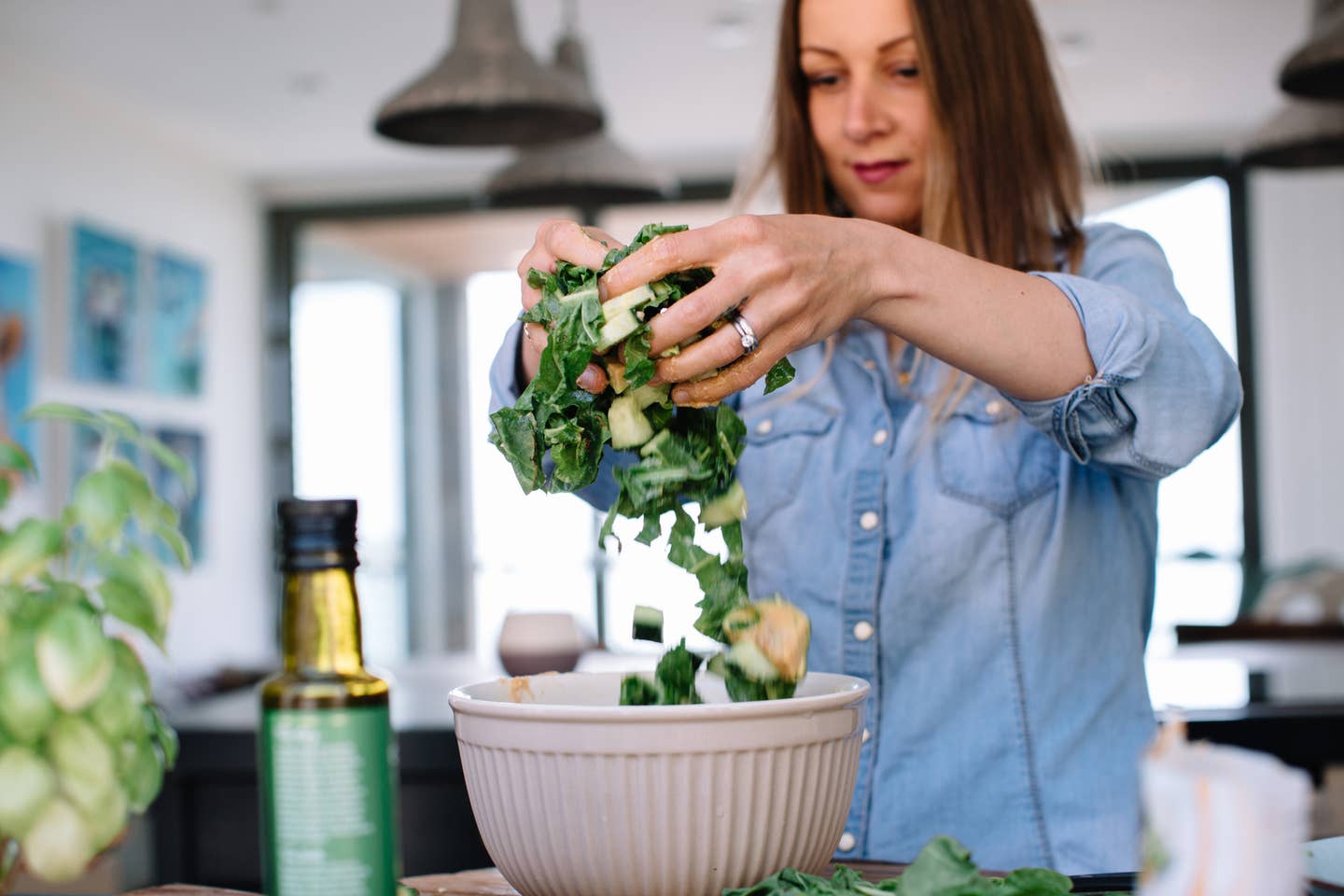
The 7 Best Tips to Not Gain Weight While Working and Sheltering at Home
The New York Post calls it the Quarantine 15. As insensitive as it sounds to worry about gaining weight while working from home when people are getting sick and are worried about loved ones, it's our responsibility to stay strong and healthy, to take care of others. And part of being healthy is choosing healthy foods, exercising, and not stress-eating our way through this crisis.
If my number of trips to the kitchen is any indication,15 is the least of what I'm likely to gain. I literally have not stopped eating since I moved my work to my home last week. Breakfast generally starts out okay, of a little granola and almond milk (unsweetened) but then by mid-morning I am pulling out the chips, leftover (plant-based) pasta with Gardein crumbles, vegan party mix, and before I know it I've eaten the equivalent of four or five meals before 4 p.m.
What? How did I let this happen? Every day I resolve to do better, make a healthy protein-packed, green and berry smoothie, and I start out feeling like I have the best of intentions. And every day, whether on conference calls or just sitting writing and editing, answering emails or straightening up (I do a lot of that), I find myself traipsing back to the cupboard, looking for something healthy, reaching for something carb-laden like the bag of tortilla chips that never seems to go into the garbage. Salty, stale and crunchy, they hit the spot.
Before the isolation began, I managed to "intermittent fast" and lose some weight
For help in this situation (I can't even blame stress eating, since I think it's more "bored eating" I sent a plaintive missive asking for "help" to my new favorite diet doctor, Dr. Jason, Fung, MD, a nephrologist (kidney specialist) and one of the world's leading Intermittent Fasting experts, who has written three best-selling health books and founder of The Fasting Method. His newest book, Life in the Fasting Lane, co-authored with Eve Mayer and Megan Ramos, tells you everything you need to know to use this technique to get to and maintain a healthy weight and stay energized.
Dr. Fung's first interview with The Beet had put me on the right track. I started eating during a window between about 2 p.m. and 8 p.m. and then not eating for the other 16 hours on the clock. This method helped me slim down, fit into my jeans better and find myself with more energy and focus. I don't weigh myself but I can always tell how my maintenance plan is doing by how my clothing fits.
The Intermittent Fasting method helped me fit into my jeans better, without craving junk food and this way of eating lets me feel like I was in total control of my body, my diet, and my health. I have never been a keto dieter, but IF is the most searched term of the past year, so it's safe to say more people are using IF, either with or without their keto approach, because it works.
Then, I put myself on what feels like house arrest. It's isolating and food is small comfort. So is babysitting my brother's snuggly Italian Sheep Dog, Bonnie. She actually creates a distraction and keeps me calm and less bored, so I end up eating less when I am watching her, which would be my tip. Dog sit!
Yesterday I did not exit out of my four rooms all day. Which meant more time to circle past the kitchen and pantry for snacks. So here is what Dr. Fung has to share. And what I share with you. The idea is to put me back on track and help you avoid the inevitable desire to eat our way through the lockdown.
Here is Dr. Fung's Advice on How To Stay On Track During The Coronavirus Isolation
1. Drink Tea, and lots of it! "I've been self-isolating and drinking lots of tea. The antioxidants in green tea may suppress the appetite, but it gives me something to 'do' instead of eating. I've replaced a bad habit with a harmless habit. I have gone back to drinking tea like an Asian, which is to brew a pot of tea and keep sipping it throughout the day."
"When it is finished, I simply add more hot water to the tea leaves. I use a cup with a lid that keeps the tea hot. This is actually what I used to do as a student, when I spent many hours in my room studying, and the way my parents drink tea. I've also been changing up tea flavors every now and then. Pique Tea has some great fasting teas (I helped them develop them) with flavors like Bergamot Green and Cinnamon."
2. Stay busy. "The key question to ask yourself is this: Are you hungry or are you just bored? Most of the time, we are simply bored, and that has us scrounging around the kitchen for lack of something to do. I bought myself a paint by numbers kit (surprisingly relaxing) and downloaded two ebooks from the library. I subscribed to chess.com and decided that I would try to learn the game, which I've always meant to do, but never had time for. I've also decided to spend a bit more time working out."
3. Stay out of the kitchen. "Whatever you do, do NOT do your work or read or calls, etc. in the kitchen. That's an open invitation to snack. I like to go into my study and allow my natural laziness to keep me from going into the kitchen. My other favorite thing to do is to snuggle up in a warm blanket to read or watch a movie, and my natural reluctance to get out of my warm 'nest' overcome my inclination to snack."
4. Don't snack. Stick to eat in windows. Meaning set a time when you are allowing yourself to eat, and then another time window when you are not eating. Every time you snack you cause your body to produce some insulin, which we know is a major driver of weight gain. Eat those almonds but eat them with your lunch or dinner, not in between. Hunger comes in waves, so just ride them out! If you feel hungry, try to distract yourself by doing something you've been putting off in your house like hanging a shelf or cleaning out a closet. Not only will your hunger pass, but you'll also feel relief from being able to organize your clutter!
5. Stay connected. We might have to practice social distancing in person, but that doesn't affect how we interact on the web. Connect with online communities to keep you feeling motivated. Dr. Fung and Megan Ramos offer support through their community, The Fasting Method. They offer live and interactive support groups as well as eating and fasting group challenges that are sensitive to what's going on.
6. Have a glass of water. Before you reach for something to eat, when you feel a hunger pang, drink a glass of water. We often mistake thirst for hunger. Many people find that carbonated or mineral water is especially good at suppressing appetite.
7. Practice stress reduction. Breathe, Meditate, do Yoga. with activities like deep breathing, yoga, and mediation instead of reaching for the pantry. These are stressful times and you may not even realize that you're thinking about your job, your paycheck, the market, the economy, and how long all this will last. If you are stressing you are sending cortisol through your body and that can lead you to self-soothe with carbs and other serotonin-boosting foods. Yes, there are reasons to be stressed, but being unhealthy or eating bad food won't help. Breathe. To alleviate stress before it starts, create a daily routine and stick with it. Having a routine reduces stress on the body, which can keep cravings for comfort foods at bay.
Okay. I am trying these tips! Let me know your best advice about staying healthy during the COVID-19 lockdown in the comments below. I would love to hear them. I need to hear them. And of course, stay healthy out there! Write and lend me your best tips—we may even publish them—at info@thebeet.com.
More From The Beet






